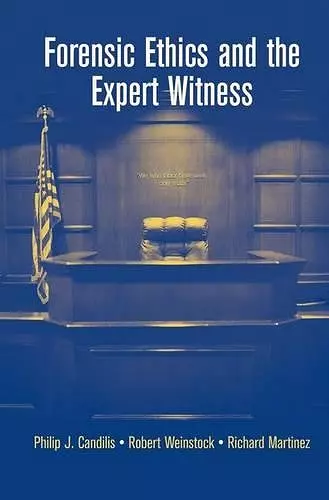Forensic Ethics and the Expert Witness
Robert Weinstock author Philip J Candilis author Richard Martinez author Andrew Szanton editor
Format:Paperback
Publisher:Springer-Verlag New York Inc.
Published:29th Oct '10
Currently unavailable, and unfortunately no date known when it will be back

Why a book about the ethics of forensic psychiatry and related disciplines? Most psychiatrists, after all, learn something in their training about the ethics of medical practice in general and of the practice of psychiatry in particular. Do the maxims that steer all physicians through the ethical complexities of clinical medicine not provide equally effective guidance to clinical and scientific expert witnesses? The answer, in short, is “No. ” When psychiatrists, for example, enter the realm of the expert witness, they tread on moral terrain with a significantly different topography than the paths to which they are accustomed in their clinical roles. Clinical psych- trists owe primary allegiance to their patients’interests; for them the prin- ples of beneficence (doing good) and non-maleficence (avoiding harm) will generally take priority over all other considerations. For psychiatrists who serve as experts, however, there are no patients to whom fidelity is due. There are only persons being evaluated for the sake of providing opinions to third parties. Perhaps a defendant in a criminal case, a plaintiff in a tort action, or a claimant in an adjudication of disability benefits or workers’ compensation—but not a patient. And that makes all the difference. Whatever its other virtues, no theory of the ethics of forensic psychiatry will serve its purpose unless it offers the psychiatric expert direction in dealing with this situation.
"This was a rich, complex, and carefully written presentation of seminal and original thinking by three highly respected and experienced forensic psychiatrists....The take-away message from this thoughtful volume is that, in the authors' opinion, it is possible and perhaps highly desirable, in carefully selected situations, to wear two hats and combine the role of therapist with that of an expert witness....These well respected authors argue in a persuasive fashion and hopefully have sparked a worthwhile debate and a new look at the old maxim."
- Elissa P. Bendek, MD
American Journal of Psychiatry
"Forensic experts must struggle with the conflicting ethical demands of two roles, that of the clinician devoted to the care of patients, and that of the legal expert committed to the pursuit of justice. Whereas previous attempts to bridge this chasm have sought to separate these roles and avoid conflicts of interest, the authors of this volume have taken a radically different perspective. They have developed an integrated ethical approach based on a richly nuanced view of professional integrity. This book will surely shape the field of forensic ethics for years to come."
- Robert D. Truog, MD
Professor of Medical Ethics, Anaesthesia, and Pediatrics
Harvard Medical School
"Rich in concepts and provocative examples, this monograph on aspirational ethics takes us from history to practice to pitfalls an expert witness may encounter in this complex work. The authors, professional ethicists, skillfully orchestrate the viewpoints of different disciplines, using the techniques of the forum, the dialogue, and the argument to enrich their discussions of ethical dilemmas. As an added bonus, instruction on ethical principles and reasoning is woven through the material. This would be an excellent text for ethics courses as well as an aid to the practitioner."
-Thomas G. Gutheil, MD
Professor of Psychiatry, Harvard Medical School
Past president, American Academy of Psychiatry and the Law
"Candilis, Weinstock and Martinez make a major contribution to the discussion of bioethics and forensic psychiatry. The authors provide a comprehensive, clearly written history of bioethics and their own intriguing approach, "Robust Professionalism," to the analysis of ethical issues confronting forensic psychiatrists. They use the crucible of case examples to explore the strengths and weakness of a number of ethical systems and to demonstrate the components of sound ethical reasoning. A pleasure to read, this informative book is essential reading for forensic psychiatrists, scientific experts who provide courtroom testimony, attorneys and bioethicists."
-J. Richard Ciccone, MD
Professor of Psychiatry
University of Rochester School of Medicine
"Candilis and his colleagues have done a masterful job of setting out this history of forensic psychiatry ethics. Their scholarly explication of the subject also makes clear how complicated it is to work ethically in this subspecialty arena of medicine. This is a landmark text that makes a brilliant contribution to forensic ethics precisely because it is balanced, thoughtful, and persistently relevant to the work of forensic psychiatrists."
- Ezra E. H. Griffith, MD
Professor and Deputy Chair, Department of Psychiatry
Yale University School of Medicine
ISBN: 9781441942005
Dimensions: unknown
Weight: unknown
211 pages
1st ed. Softcover of orig. ed. 2007